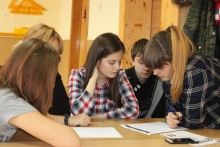
The interactive training was hold for School Energy Management Teams (SEMT) members – pupils of 10-11 grades from pilot project schools (№1 та №16) on December 25, at the last day of education period. The training was conducted in the premises of Mukachevo school №16 and it was aimed at improving their knowledge about energy efficiency, renewable energy and climate change. Trainer from Kiev Catherine Miroshnichenko combined movement games with discussion of smart energy consumption during this training. For example, participants were divided into teams and they had to find those participants who represent the same source of energy as they did. And what is interesting - the exercise was conducted in silence, only via gestures.
One more task was to connect the halves of aphorisms concerning the topics of energy efficiency: participants received one piece of aphorism, and among the particles spread out on the floor they had to find the second part of the sentence, like "To cut tropical forests for fuel wood - it's like making a fire from Renaissance pieces of art».
Mentioned exercises were a kind of warm-up for more serious tasks. As SEMT members already have some knowledge about energy efficiency, they played a game aimed at being more aware about energy efficiency motivation: one team was asked to write as many reasons of energy saving as they can, another – reasons why they do not do this. Then both teams present their results. After the presentation the teams changed roles and the team that collected the reasons for not saving energy, was given the task to give objections why energy should be saved, the other team – vice versa. Then teams had a joint discussion, chose the strongest arguments why some people do not save energy, and discussed the options that can motivate or facilitate energy saving.
Then the students under the supervision of trainer conducted the express-energy audit of the school №16 with the definition of school problems and the level of used resources and compare it with the results of the energy audit, which was conducted previously by the energy audit company. SEMT members conducted also the survey of the school outside, using infrared thermograph and determined heat losses of the school premises. Besides It turned out that they did not collect waste paper in the school, there were no labels that would remind about the need to turn off water and light.
Then movement game was conducted for pupils to have a rest - the energy saving range, when all the pupils stand in a circle and “transferred energy" without losses one by one. Transmitted energy was considered successful when the participant claps hands simultaneously with the first member on the left, and then - with the second on the right. Thus energy has to circle with minimal losses. There was also a quick “energizer” named "Accumulating the energy" to warm-up the participants. Participants had to shout together the word "energy" starting with E sound, and then do it in a circle wave - that trainer starts to shout this sound and she waits until the sound comes back to her. Then all participants simultaneously shout- NERGY.
Finally, the pupils developed a plan of activities for the next year, consisting of the following paragraphs: What is the problem? What actions can we do? Who will do this? When it will be done? How will we monitor the progress? How will we know that goal was reached? How much it will cost?
Teachers – heads of SEMTs will also make their input into final elaboration and implementation of the plan on ways of more effective use of energy resources in schools in 2016.
To consolidate the got knowledge there were discussed the most remembered moments of the training and plans for further work.
Enjoy photo-report at https://www.dropbox.com/sh/q6ky8ee1tb8d024/AAAgewcTX27WgD6s4-5OGA8va?dl=0
And TV-news that was broadcasted on December, 26, 2015 at M-Studio TV Channel (start at 7 min 27 sec): https://www.youtube.com/watch?v=cWLVfKJo-WU
Additional info: “YES - Young Energy Specialists against energy waste in cross-border schools” project is being implemented since October 2013 until December 2015 in framework of the Cross-border cooperation Program Hungary-Slovakia-Romania-Ukraine ENPI for 2007-2013, under priority 4: Support people to people cooperation, Measure 4.2. Small scale “People to people” cooperation.




